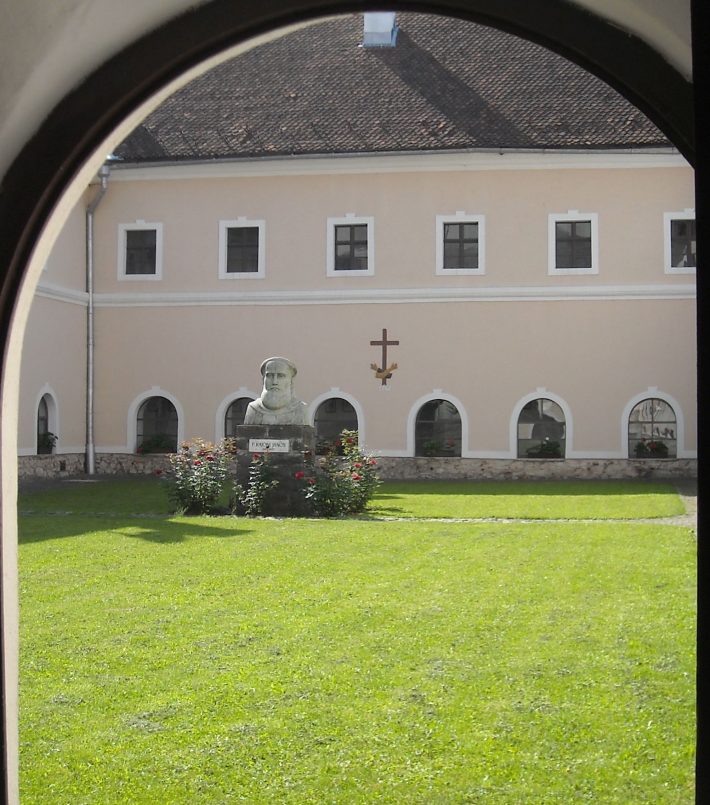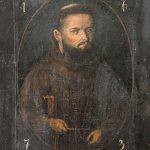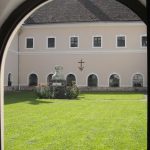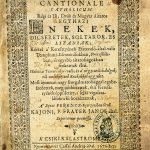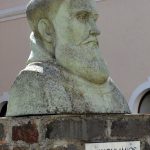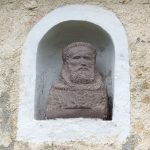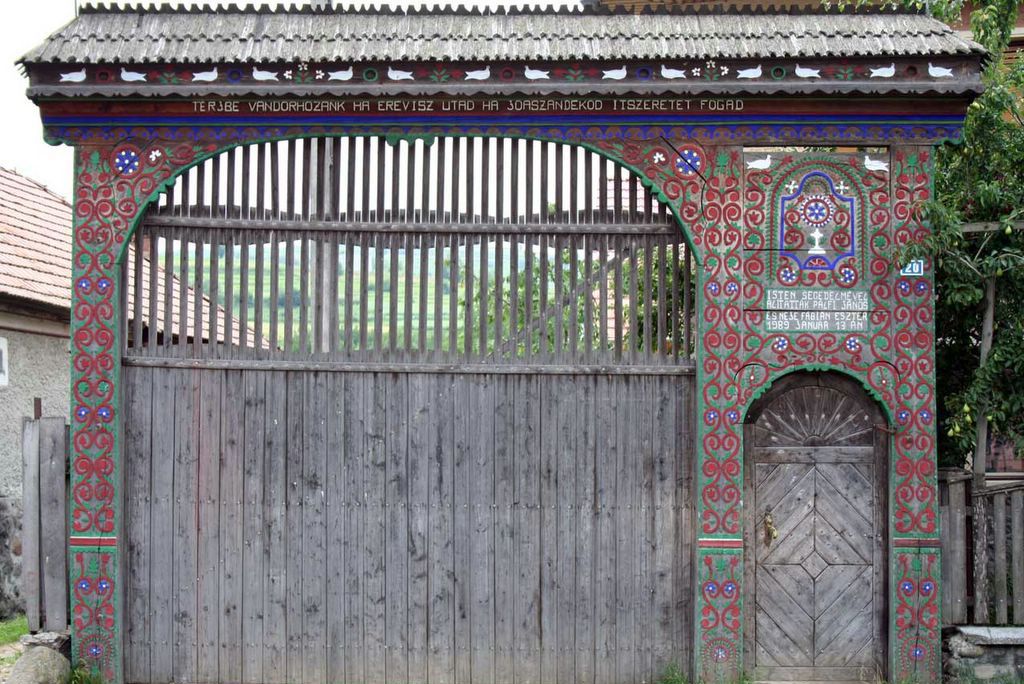- Details of the Proposer
- The name of the proposer (person, institution, organization, enterprise): Kájoni János County Library
- The details of the proposer or the contact person:
Name: Kelemen Katalin, Kájoni János County Library, head of department
Address: 530223, Miercurea Ciuc, str. Stadion 1/bis
Phone number: 0720544093
E-mail: kelemen.katalin@yahoo.co.uk
- Details of the County Value
- Name of the County Value: Joannes Kajoni’s lifework
- The county value’s classification by specialization:
- Cultural Heritage
- Location of the county value: Pilgrimage Church and Monastery of Şumuleu-Ciuc; the Franciscan Monastery of Lăzarea; the 16th and 18th century stock of the Franciscan Monastery from Şumuleu-Ciuc that is kept in the Csíki Székely Museum’s (Szekler Museum of Ciuc, Miercurea Ciuc) old book collection, where Joannes Kajoni’s survived printed works and internationally acknowledged musical manuscript can also be found.
- Denomination of the vault in which value’s collection inclusion is initiated:
- county
- The county value’s short, textual presentation, description of the unique story and characteristics
Biographical information:
Joannes Kajoni is a 17th century scholar Franciscan friar, composer and melody collector, organist and constructor and repairer of organ, press office founder and publisher, architect, historian, botanist.
His biographers think otherwise considering his birth place, most likely he was born in Leghia Jegenye (Cluj County) at the end of 1629 or at the beginning of 1630, according to other sources he was born in Căianu Mic (Bistrița-Năsăud County). He cames from a Romanian family, he himself also used the word “valachus” alongside his name. In the Romanian literature is also known as Ioan Căianu or Ioan Caioni, but he mostly used the Latin version of his name, Joannes Kajoni.
He entered the Franciscan order when he was 18 years old on the 7th of September of 1648, and he was ordained a priest in 1655.
The rich life work of the franciscan monk is strongly connected with Șumuleu-Ciuc, because as the young organist of the monastery he also repaired and made several musical instruments between 1652 and 1657. In 1659 he helped to obtain the organ for Șumuleu-Ciuc, later he repaired and rebuilt it after it was burnt in 1661 during the Tartar invasion.
It was Kajoni who lead the constructions of the monasteries of Lăzarea and Căugăreni, he also built organs for Șumuleu-Ciuc, Lăzarea, Căugăreni and Odorheiu Secuiesc.
He was appointed head of the Franciscan monastery of Căugăreni in 1663, in 1666 he initiated the construction of the stone building, he even built an organ for the building. Two of his outstanding musical works were written in Căugăreni as well. In 1667 he made a musical collection named Organo Missale for Franciscan pupils and organists. He edited his so-called Sacri Concentus work containing several motets in 1669 based on the works of the Italian composer, Lodovico and Viadana.
During his life, Kajoni was very active to help the Franciscan monastery from Lăzarea. In 1664 he got his first nomination as the guardian of the monastery of Lăzarea, between 1669 and 1975 he was the guardian of the Francisacan monastery again. These times were the most fertile during his life considering his activeness as he rebuilt the chapel and the monastery, and he even built an organ in Lăzarea. Also in 1671, he finally finished his great musical manuscript, named after the Franciscan monk, the Codex Caioni.
He founded the first press office of Szeklerland in 1676, where the first published work of this press office was his catholic hymnal under the name of Cantionale Catholicum.
Between 1675 and 1678 he was the guardian of the Transylvanian Franciscan Custody, and continued his activity as the local bishop.
Between the period of 1681 and 1684 as the house lord of Șumuleu-Ciuc he had been working for the restoration of the church and the convent, then in 1682 he consecrated the church. Kajoni’s spirituality is still alive, Franciscan people still keep his memory in respect.
During his lifetime he had always been active handling the Transylvanian Franciscan custody’s issues. He’s also considered as the guardian of order, he wrote the history of Transilvanian Franciscan custody beginning from 1630. The manuscript is known under the title Liber niger or the Black Book (1683-1684).
His rich work was interrupted by his sudden death in the monastery of Lăzarea, in 1678 at the age of 57. His wish to be buried in an unmarked grave was fulfilled. After his death he probably rests somewhere next to the altar of the church.
- Motivating the Inclusion into the County Values:
Joannes Kajoni with his huge knowledge was a real humanist personality of his age, who is also said to be a polymath. He contributed with his theological, musical, literary, historical and botanical works to the development of 17th century Transylvanian culture.
Kájonis’ rich oeuvre is strongly connected to Șumuleu-Ciuc. Even the foundation of the Franciscan press office from Șumuleu-Ciuc is associated with him. The press office founded by him was the first catholic press office of Transilvania until the first half of the 18th century. Kajoni printed his catholic hymnal under the name of Cantionale Catholicum, as the first publication of the book press, which had become one of the most significant catholic song collections of the 17th century. The press office had worked for more than two centuries in Șumuleu-Ciuc, a lot of ecclesiastic publications, prayer and yearbooks, school books were printed there. In 1849 they printed the numbers of the so-called “Hadi Lap” revolutionary publication. Currently, the renewed book press can be found on the exhibition of the Szekler Museum of Ciuc (Miercurea Ciuc) with publications from the 17th and 18th centuries.
Besides dealing with the Transilvanian Franciscan custody’s issues, Kajoni had also been organizing and enriching the Franciscan library of Șumuleu-Ciuc, one of Transylvanias’ oldest and most valuable catholic collections.
The most popular and valuable field of Joannes Kajoni’s lifework is his musical activity. He is the first Transilvanian musician, who gained fame throughout Europe. His survived works prove his connection to the European intellectual culture.
The most valuable musical work of his is said to be the Codex Caioni, a very significant musical source of the Central and Eastern Europe and within that, the 17th century Transyilvanian music history.
This musical collection that was thought to be lost for a long time, was found among the Franciscan monastery’s library of Șumulu-Ciuc in 1985. Nowadays the manuscript restored at the end of the 1980s can be found in the Szekler Museum of Ciuc. A modern edition of this manuscript appeared in 1993 with the name Codex Caioni within the Musicalia Danubiana series.
The greatness of the scholar Franciscan monk had already been discovered by his contemporaries, still, his true humanist personality was recognized after 2 centuries. His oeuvre had been researched by many people, attempting to place him in the history of culture. The bibliography of the Kájoni-research is very affluent, some of his works got published again.
The literature records more than 20 titles of manuscripts that survived and was available in printed form. In terms of content his works are characterized by a huge diversity, such as ecclesiastic and world literature, hymnal, Latin-Hungarian poem collection, monastic order, calendar, prayer book, herbarium, szekler alphabet and historical work.
Kájoni’s name is highly respected among Transylvanian people, his name and remembrance lives there in his homeland, his name worn by institutes in Harghita County, such as the Kájoni János County Library in Miercurea Ciuc and also the Joannes Kájoni High School of Șumuleu-Ciuc.
Remembering the 350th anniversary of his birth, a memorial concert was organized under the name of In Memoriam Joannes Kajoni, on the 20th of September 1979 in the Mikó Castle. This concert is the forerunner of the present Early Music Festival from Miercurea Ciuc. His spirituality and musical legacy has accompanied the Early Music Festival that has grown into an international event. In 2019-2020 the Joannes Kajoni 390 Memorial Year was dedicated to the commemoration of Joannes Kajoni in Transylvania.
- Sources
Bibliography:
Caioni’s works editions:
Codex Caioni saeculi XVII (Facsimile şi Transcriptiones). Edition by Saviana Diamandi, Agnes Papp. Vol. 1-2. Editura Muzicală a Uniunii Compozitorilor şi Muzicologilor din România şi MTA, Zenetudomanyi Intezet, București – Budapest, 1994, 1993. (Musicalia Danubiana 14/B).
Kájoni János: Organo Missale. Edited by: Richter Pál. Miercurea Ciuc, Státus, 2005.



